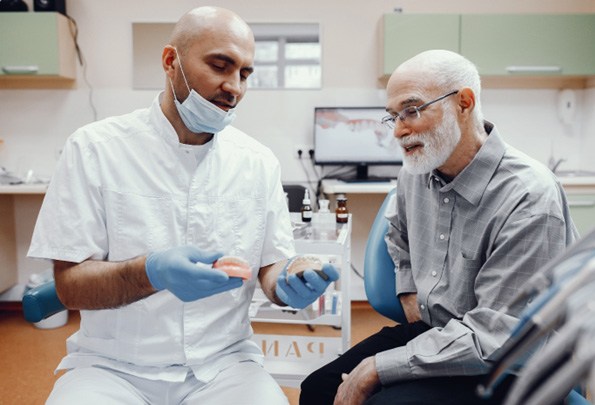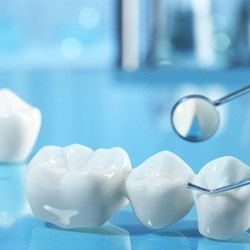Who’s a Good Candidate for Dentures?

Whether you’re missing one tooth or many, almost anyone can get dentures. Being a good treatment candidate doesn’t require that much. Still, you must consult
Dr. Kaopua
to confirm whether dentures would work for you. He can assess your smile and see if the restorations are a suitable option. In case they aren’t, he could also make you a later candidate by healing your gum tissue and bone structure. To learn more about denture candidacy, keep reading or
call our office
for details.
Learn More
Effects of Missing Teeth

When considering denture treatment, it’s helpful to review tooth loss’s causes and effects. This step reinforces how prosthetic teeth could help your smile.
In truth, people of all ages lose teeth for various reasons. A tooth, for example, might decay to the point it falls out or needs replacement. On the other hand, gum disease can erode the bone and tissue that secure your chompers. Even dental injuries from accidents sometimes lead to knocked-out teeth.
Regardless of the cause, however, tooth loss effects are pretty consistent. Those with missing teeth almost always struggle to speak, eat, or even smile. Plus, leaving smile gaps untreated will cause your jaw to degrade. That latter process could trigger a facial collapse and yet further tooth loss.
What Qualifies You for Dentures?

As stated above, most patients qualify for dentures simply by lacking teeth. That said, other factors worth considering exist.
Take oral health, for instance. Dentures could replace not only your missing teeth but also your decaying ones. Furthermore, you need healthy gum and jaw tissues to be a good treatment candidate. Your mouth wouldn’t be strong enough to support dentures otherwise.
The number of lost teeth is also relevant. Based on how many are missing, you’ll need one of two possible denture types. The first, a partial model, is best for replacing a few teeth. A full denture, meanwhile, is preferable when all pearly whites along an arch are gone.
Finances are also crucial to your considerations. Dentures, you see, are cheaper than other restorations. As such, you might be a good candidate if you’re on a budget.
Alternative Tooth-Replacement Options

Should you not be a good denture candidate, that’s okay; we have additional options. More specifically, Albright Family Dental has two other procedures you could try. These include:
-
Dental Bridges
– A dental bridge is a fixed restoration made of crowns fused to a pontic. It relies on surrounding teeth for support, so it’s best for patients who’re only missing one or a few chompers.
-
Dental Implants
– Unlike dentures or bridges, dental implants are prosthetic teeth placed in your jawbone. Their titanium material lets them fuse with your jaw over time. Given this fusion, the new teeth are secure, permanent, and pricey compared to alternatives.
Learn More About Dental Bridges
Learn More About Dental Implants
Types of Dentures

A denture is made of prosthetic teeth attached to a plastic gum-colored
base. Different kinds of dentures are available depending on individual
patient needs and preferences.
-
Partial Dentures: If you have multiple missing teeth,
partial dentures can fill in the gaps without needing to remove the rest
of the arch. Metal clasps are used to attach the dentures to your natural
teeth for added stability.
-
Full Dentures: Traditional full dentures remain as useful
as ever for replacing entire rows of teeth. Modern techniques have made
full dentures even more comfortable, and they can be designed to fit
securely on your unique gumline.
-
Implant Dentures: We can anchor dentures to dental
implants so that you can continue to enjoy the benefits of teeth supported
by roots that have integrated with the jawbone.
Benefits of Dentures

When someone is missing multiple teeth, it can be challenging to complete tasks they once found easy. This includes chewing their food, speaking clearly, and smiling with confidence. Fortunately, dentures are a life-changing tooth replacement option for patients who are missing multiple or all of their teeth. It can improve the quality of life! If you’ve struggled with tooth loss, dentures can give your smile another chance by providing the following benefits.
Learn More
Psychological Benefits

People who no longer have teeth can have difficulty accepting their tooth loss. This can lead to effects on self-esteem and social life. Those who are insecure about tooth loss are also less likely to engage in social activities. Ultimately, it can mean a higher risk of experiencing sadness and depression. By restoring the appearance and function of one’s smile with dentures, patients can see an increase in their confidence. Dentures reduce anxieties about appearance, speech articulation, chewing ability, and more!
Clearer Enunciation

It’s more difficult to speak when you are missing teeth. To pronounce and perform words, your lips and tongue need to be positioned properly. Without the ability to touch your tongue to your teeth, some words are very difficult to say clearly. Because dentures act as missing teeth, they allow wearers to enunciate more clearly when speaking. After just a short adjustment period and a little bit of practice, speaking will come naturally.
Improves Nutrition

Many nutritious foods are tough in texture. This includes vegetables, fruits, and healthy proteins. When you can’t chew your food thoroughly thanks to tooth loss, you can experience issues like indigestion or malnutrition. With an improved ability to chew, dentures allow for a more expensive diet filled with nutritious foods. This way, your body can receive the essential nutrients it needs for optimal overall health.
Preserves Oral Health

If you still have some natural teeth, getting dentures can keep them from shifting around to other areas of the mouth and causing issues. Dentures also bear some of the weight of regular chewing, reducing the wear and tear of your existing teeth.
Expands Opportunity

Your smile is one of the first things people notice when they meet you. When it comes to job interviews, sales, and getting promotions, it is crucial to make an excellent first impression. Having a complete smile is certainly an advantage!
Tips for Day-to-Day Use

-
Never let your dentures dry out. When you take them out at night, be sure
to soak them in a denture cleansing solution. Dry dentures could easily
fracture.
-
Brush your dentures on a regular basis. Don’t forget to brush the
gums as well; bacteria can still build up in the space between the
dentures and the tissue.
-
Take the time to practice speaking with dentures; when you’re first
getting used to them, it helps to repeat words that you have trouble
pronouncing.
- If your dentures slip out of place, gently bite down and swallow.
Understanding the Cost of Dentures

You want to rebuild your smile with the help of dentures. Their popularity and ability to restore a person’s ability to eat, speak, and smile with confidence are evident. You’re ready to take the next step, but do you know how much they will cost? Determining how much you can expect to pay for your new set of teeth requires a scheduled consultation with our team. But before you arrive, feel free to review the information below, as it discusses more of what you can expect when it comes to the cost of dentures in Everett.
Learn More
Factors That Affect the Cost of Dentures

Replacing your missing teeth is important, but appropriate steps must first be taken to ensure the process is successful, and the price is right. Most patients become deterred by a particular treatment option once they learn the cost, but the truth is that no two cases are alike, so the price point for dentures is always different.
Our team will consider a few different factors before creating a cost estimate you can review. These include not only how many teeth you need to have replaced and the type of denture you’ll need (full or partial) but also if you require any pre-denture treatment (i.e., periodontal therapy, bone grafting) and the type of materials used to craft the prosthetics.
You might consider cheaper options that help you to save a few dollars, but keep in mind, these materials will not hold up as long as higher-quality ones that are used by our team. Instead, you’ll be left to replace them more frequently, resulting in more money spent.
Are Implant Dentures More Expensive?

There is the option to choose implant dentures; however, you should know that they are more expensive. But when you consider the cost comparison, you might actually save by choosing a more permanent prosthetic like implant dentures. The reason is that they permanently fuse with the jawbone, so they can remain in place for 30+ years or a lifetime. Also, they offer maximum stability and bite force, so you can eat your favorite foods and never worry about slippage.
Does Dental Insurance Cover Dentures?

In most cases, there is a good chance that your dental insurance company will cover a portion of your dentures (up to 50%). This depends on the company and its individual plans. A member of our team will be happy to review your policy and go over your available coverage so that you can plan properly when it comes to paying for your treatment.
Other Options for Making Dentures Affordable

If private dental insurance is something you are not enrolled in, there is still a way to achieve a complete smile without breaking the bank. With flexible financing through CareCredit, you can spend less upfront and instead, spread out the cost of your care over several months, paying it down as you go.
Dentures Aftercare

While dentures can transform and improve your smile entirely, you’ll need to take proper care of them so that they last. After all, you’ll eventually need to replace them with new ones, but that doesn’t mean you have to do so prematurely. Other than visiting your dentist every six months for routine checkups, here are several other ways that you can care for your dentures so that you can make the most of your tooth replacements.
Learn More
Removable Dentures

Remove After Eating
Once you’ve finished eating your food, take out your dentures and rinse them off. This will keep food debris and bacteria from accumulating around them. You’ll also have a chance to clean your gums to prevent any plaque from forming there as well. Don’t use hot water, as this can end up warping your prosthetics and cause you to need to adjust or replace them.
Clean Your Prosthetics
As mentioned above, it’s best to remove your dentures to clean them thoroughly, as you’ll be able to clean the underside that meets your gums. Brush with a soft-bristled toothbrush and use a small quantity of hand soap or denture cleanser. Avoid using regular toothpaste as this can be too abrasive for your prosthetics. Store your dentures in a container of water or cleansing solution if you aren’t going to wear them again, that way they stay moist and don’t lose their shape. Rinse them again before wearing them so that you don’t ingest any cleaning materials.
Keep Your Dentures Safe
While brushing your dentures, place a soft towel underneath them in case they accidentally slip and fall from your grip. This can help minimize any damage to them. When not in use, place them in a cup of water or denture cleanser. Be sure to keep them out of reach of pets and small children.
Remove Dentures When You Sleep
Remember to take your dentures before going to bed. Soaking them overnight will not only keep them bacteria-free until you wear them again, but you’ll also allow your gums the rest they need. Keeping your prosthetics in for too long can irritate your gum tissue, restrict circulation, and prevent your gumline from getting the necessary nutrients. You can also raise your risk of pneumonia and gum/tongue plaque, so make sure to take them out and soak them in water or a denture cleanser.
Notice Changes
Be on the lookout for any changes to your dentures or your mouth while you have them. This includes any damage to your prosthetics as well as gum irritation, mouth sores, and indications of infection. Notify our team right away so we can help alleviate your symptoms and address the root cause of the issue so you can get back to enjoying your full smile again.
All-on-4 Dentures
Since All-on-4 dentures are anchored by dental implants, they’ll function much more like your natural teeth, especially since they shouldn’t be able to shift out of place. This means you’ll simply need to practice normal oral hygiene by brushing and rinsing with mouthwash every day to keep them clean and your mouth healthy. You might also use a dental threader if this allows you to clean in between the underside of the prosthetics and your gums.
Denture FAQs

If this is your first time getting dentures, chances are that you’re currently struggling with the mental toll that often comes with extensive tooth loss, which in turn can make the process of getting new teeth stressful. To make things easier for you, our team is ready to answer any questions you might have about dentures in Everett. If you can’t find what you’re looking for among the FAQs below, please give our team a call so that we can address your specific concerns.
Learn More
How Long Will I Have to Wait to Get Dentures After Having My Teeth Pulled?
The normal wait time between having your teeth extracted and receiving dentures is between six to eight weeks. The exact amount of time can vary quite a bit depending on a few factors, such as how many teeth needed to be removed.
The reason for the delay is that it takes time for your gums to heal properly, and we want to make sure your mouth has fully recovered before we give you your new teeth. There are cases where you might be able to get a denture on the same day as your tooth extraction, but because the shape of your jawbone will likely change during the healing process, you’ll need to switch your denture out for a new one later.
Does Getting Dentures Hurt?
You may experience some soreness after having your teeth removed. Make sure you’re taking your prescribed pain medication as directed to manage your discomfort. As for the actual dentures themselves, they might irritate your gums at first, but this will fade as your mouth adjusts to your new teeth. The adjustment process can take several months, but if the discomfort seems to be growing worse over time, let us know immediately.
Can I Sleep with My Dentures?
The simple answer is yes, you can. However, it’s generally better to take your dentures out before you go to bed. Your gum tissue and jawbone have been enduring the pressure of supporting your dentures all day; taking your teeth out will give your oral structures a chance to recover. When you take out your dentures, you can soak them in a glass of denture cleaning solution. This will prevent them from drying out while also getting rid of any bacteria that might have accumulated on your restoration.
Will It Be Hard to Talk with Dentures?
It will take some time to get used to speaking with dentures. Your mouth was previously accustomed to speaking with your natural teeth, so it will need time to relearn the proper movements to make with your new teeth. During the first few weeks, you may notice a slight lisp in your speech, and you might muffle your words on occasion. To help your mouth adjust to dentures faster, you can practice reading out loud to yourself and repeating any words that are giving you trouble. You can also try stabilizing your dentures with a small amount of adhesive; this can make your speech a bit clearer by ensuring that your teeth stay in place while you’re talking.





















